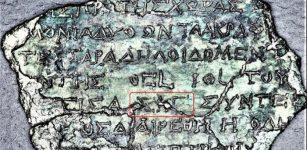Hades – Land Of The Dead In Greek Beliefs Offered Punishment And Paradise Full Of Harmony
A. Sutherland - AncientPages.com - In Greek mythology, there is a well-known myth of Hades, a harsh, shadowy place where the dead lived. Hades is also the name of the god who reigned over this inhospitable realm.
Hades does not resemble the Christian hell and cannot be compared to Irkalla, the ancient Mesopotamian underworld, or Mictlan in Aztec beliefs.
 Cerberus guarded the underworld, the realm of God Hades. Credit: Stock photo
Cerberus guarded the underworld, the realm of God Hades. Credit: Stock photo
The Greek realm of the dead is also very far from the reality of Diyu and its 18 levels of hell with awful chambers where people are tortured and constantly suffer pain.
The deceased entered Hades with the help of Charon, the ferryman and a psychopomp of Hades whose duty was to carry dead souls across the rivers Acheron and Styx that divided the world of the living from the world of the dead. It happened that also Hermes, the god, and a psychopomp, led the spirits of the dead to the afterlife; in Egyptian beliefs, this role had Anubis, the god of death, mummification, embalming, and the afterlife.
The underworld of Hades had five magical rivers. Each of them had its symbolic meaning: Phlegethon (fire), Lethe (oblivion), Acheron (the river of sorrow or grief), Cocytus (lamentation), and Styx (hate), the principal river in the underworld, which formed the boundary between the upper and lower worlds. The Greek gods swore upon the river Styx. Their oath was sacred, and if any deity was guilty of breaking it, he was deprived of divine drink (nectar) and ambrosia, which the gods traditionally consumed during their banquets.
The far side of the river was guarded by Cerberus, the three-headed dog, defeated by Heracles (Roman Hercules). Passing beyond Cerberus, the shades of the departed entered the land of the dead to be judged.
Then, the souls passed the entrance guarded by Cerberus, the three-headed dog was usually kind when the deceased had just arrived, but he became very aggressive when someone tried to get out.
Finally, they entered the realm of Hades and appeared before the judges (past kings and sons of Zeus) who passed verdicts on the dead. They weighed the mistakes and good deeds of souls, and the deceased was rewarded or cursed.
The painting depicts Aeneas' journey in the Underworld led by the Cumaean Sibyl (Aeneid VI, 269-282). Credit: Public Domain
If someone was once a brave hero or a good ruler, the judges sent them to the Elysian Fields (Elysium). In Greek beliefs, it was a part of Hades, destined for souls of good people who can enjoy feasts and celebrations, and can be compared to Valhalla in Norse mythology.
Those souls, who had committed serious crimes against the gods, would be sent to the Fields of Punishment, a part of Tartarus, where the dead, like a giant Tityos, Sisyphus, and Tantalus, were judged to spend eternity.
Zeus sent many of the Titans to Tartarus.
Asphodel Meadows was a peaceful and pleasant place in Hades for most souls who had not achieved any extraordinary deeds nor committed evil things.
Only a Few Mortals Could Leave Hades
Very few mortals could leave Hades once they entered, but as in all Greek mythology, there were exceptions to the rule. One example was Orpheus, a son of the Thracian river god Oiagros and the Muse Calliope. He was one of the few Greek heroes who visited the land of the dead and successfully returned to earth.
Hades had many residents, including also those who were not prisoners like, for example, Hekate, the goddess of magic, many evil spirits, and demons, including the Arai, the hearts of a curse, and the three Furies, goddesses of revenge and retribution, with appearance, which was both remarkable and hideous.
Hades, who ruled over his realm, did not like unwanted visitors; he played evil tricks on visitors from the land of the living, and trespassing on the land of the dead wasn’t welcomed.
Written by - A. Sutherland - AncientPages.com Senior Staff Writer
Updated on January 06, 2023
Copyright © AncientPages.com All rights reserved. This material may not be published, broadcast, rewritten or redistributed in whole or part without the express written permission of AncientPages.com
More From Ancient Pages
-
 Sea Sequin ‘Bling’ Links Indonesian Islands’ Ancient Communities
Archaeology | Aug 16, 2023
Sea Sequin ‘Bling’ Links Indonesian Islands’ Ancient Communities
Archaeology | Aug 16, 2023 -
 They Spoke The Language Of The Gods – Secret Symbols, Unknown Books And Manuscripts – Part 2
Civilizations | May 23, 2018
They Spoke The Language Of The Gods – Secret Symbols, Unknown Books And Manuscripts – Part 2
Civilizations | May 23, 2018 -
 Did Our Ancestors Know About Artificial Intelligence?
Ancient Technology | Sep 2, 2015
Did Our Ancestors Know About Artificial Intelligence?
Ancient Technology | Sep 2, 2015 -
 On This Day In History: Vlad II Known As Vlad Dracul (‘Vlad The Dragon’) Was Born – On August 30, 1400
News | Aug 30, 2016
On This Day In History: Vlad II Known As Vlad Dracul (‘Vlad The Dragon’) Was Born – On August 30, 1400
News | Aug 30, 2016 -
 ‘Green’ Saudi Arabia Was Home To A 350,000-Year-Old Human Settlement
Archaeology | May 18, 2021
‘Green’ Saudi Arabia Was Home To A 350,000-Year-Old Human Settlement
Archaeology | May 18, 2021 -
 Mystery Of The 2,000-Year-Old Grave On The Isles Of Scilly Solved!
Archaeology | Jul 28, 2023
Mystery Of The 2,000-Year-Old Grave On The Isles Of Scilly Solved!
Archaeology | Jul 28, 2023 -
 World’s Oldest Dictionaries Are 4,500-Year-Old Cuneiform Tablets Discovered In Ebla
Ancient History Facts | Aug 19, 2016
World’s Oldest Dictionaries Are 4,500-Year-Old Cuneiform Tablets Discovered In Ebla
Ancient History Facts | Aug 19, 2016 -
 Evidence Of The Moon-Eyed People – More Clues – Part 2
Civilizations | Dec 29, 2019
Evidence Of The Moon-Eyed People – More Clues – Part 2
Civilizations | Dec 29, 2019 -
 Will-o’-the-wisp: Eerie Lights Over Swamps And Marshes That Frightened And Led People Astray
Featured Stories | Apr 23, 2020
Will-o’-the-wisp: Eerie Lights Over Swamps And Marshes That Frightened And Led People Astray
Featured Stories | Apr 23, 2020 -
 Ancient Mayans Used Saunas For Healing Purposes
Ancient History Facts | May 12, 2016
Ancient Mayans Used Saunas For Healing Purposes
Ancient History Facts | May 12, 2016 -
 ‘Georgia Guidestones’: Bizarre Ominous And Strange Monument In North America
Featured Stories | Mar 27, 2022
‘Georgia Guidestones’: Bizarre Ominous And Strange Monument In North America
Featured Stories | Mar 27, 2022 -
 Scotland’s First Farmers Didn’t Need Manure To Fertilize Their Fields – The Land Was Still Very Productive
Archaeology | Oct 12, 2022
Scotland’s First Farmers Didn’t Need Manure To Fertilize Their Fields – The Land Was Still Very Productive
Archaeology | Oct 12, 2022 -
 Huge, Cylindrical Pre-Incan Chullpas Of Sillustani, Peru Were Used As Graves For Colla Nobles
Civilizations | Mar 14, 2023
Huge, Cylindrical Pre-Incan Chullpas Of Sillustani, Peru Were Used As Graves For Colla Nobles
Civilizations | Mar 14, 2023 -
 Secret Behind Ancient Durable Maya Plaster Discovered
Archaeology | Apr 21, 2023
Secret Behind Ancient Durable Maya Plaster Discovered
Archaeology | Apr 21, 2023 -
 Salt Workers’ Residences At Underwater Maya Site – Identified
Archaeology | Nov 22, 2021
Salt Workers’ Residences At Underwater Maya Site – Identified
Archaeology | Nov 22, 2021 -
 Tomb Of A 1,000-Year-Old Sican Surgeon Wearing A Golden Mask Discovered In Peru
Archaeology | Mar 30, 2022
Tomb Of A 1,000-Year-Old Sican Surgeon Wearing A Golden Mask Discovered In Peru
Archaeology | Mar 30, 2022 -
 Ancient Calendar Predicted The Coronavirus And Other Disasters In 2020 – History Researcher Says
News | Mar 24, 2020
Ancient Calendar Predicted The Coronavirus And Other Disasters In 2020 – History Researcher Says
News | Mar 24, 2020 -
 Genghis Khan Has 16 Million Relatives – You Could Be One Of Them
Ancient History Facts | Feb 3, 2018
Genghis Khan Has 16 Million Relatives – You Could Be One Of Them
Ancient History Facts | Feb 3, 2018 -
 Humans Have Been Predicting Eclipses For Thousands Of Years, But It’s Harder Than You Might Think
Archaeology | Apr 20, 2023
Humans Have Been Predicting Eclipses For Thousands Of Years, But It’s Harder Than You Might Think
Archaeology | Apr 20, 2023 -
 Timeline Of Greek Dark Ages And Renaissance Is Wrong, New Research Shows
Featured Stories | Nov 13, 2024
Timeline Of Greek Dark Ages And Renaissance Is Wrong, New Research Shows
Featured Stories | Nov 13, 2024

